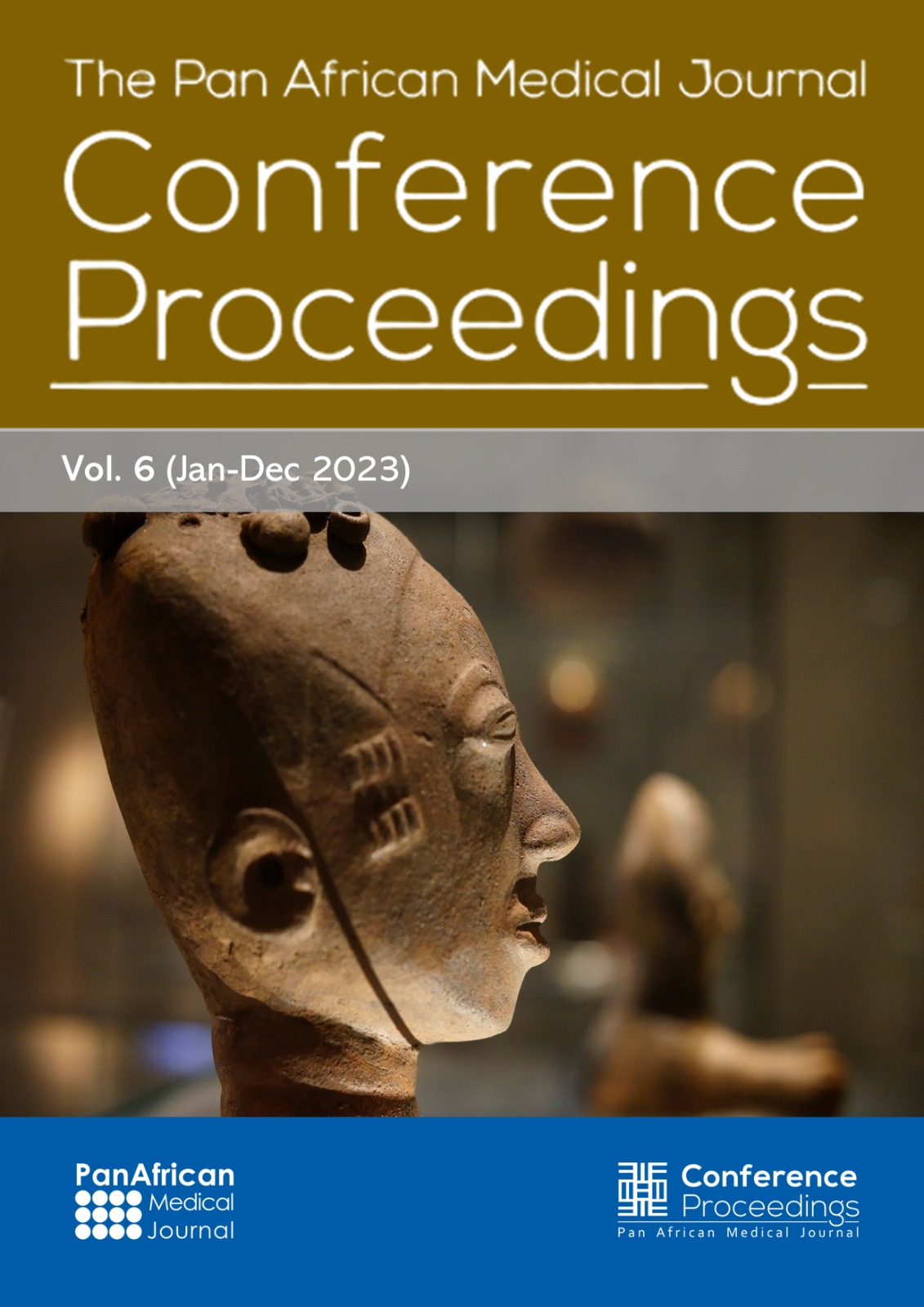Conference abstract
Abdominal ultrasonography findings in chronic heart failure patients: a 232-case series
Pan African Medical Journal - Conference Proceedings. 2023:18(87).03
Oct 2023.
doi: 10.11604/pamj-cp.2023.18.87.2166
Archived on: 03 Oct 2023
Contact the corresponding author
Keywords: Chronic heart failure, abdominal ultrasound, patients
Oral presentation
Abdominal ultrasonography findings in chronic heart failure patients: a 232-case series
Ndubi Locadine Nchiye1,&, Douanla Tane Télesphore1, Nkolo Brice Michel2, Pancha Mbouemboue Olivier1, Mbo Amvene Jeremy3
1Université de Ngaoundéré, Ngaoundéré, Cameroun, 2Université de Yaoundé 1, Yaoundé, Cameroun, 3Université de Garoua, Garoua, Cameroun
&Corresponding author
Introduction: chronic heart failure is a serious public health problem and refers to the inability of the heart to pump enough blood. It is considered to be one of the major causes of sudden death with an ever-increasing prevalence. This work aimed at studying the utility of abdominal ultrasound in chronic heart failure patients.
Methods: it was a cross-sectional analytic study, carried out from July 15th to November 8th, 2022 on chronic heart failure patients. Participant’s medical records and ultrasound machine General Electric logic 7 medical advanced systems 3D, produced in 2011, were used as data collecting tools. We hypothesized dilated inferior vena cava and/or dilated intrahepatic veins, pleural effusion, and ascites as abnormal ultrasound. Logistic regression for multivariate and univariate analyses Chi-square and exact Fisher tests were analyzed to find the sonography features of chronic heart failure and associated risk factors. The results were considered significant for pË‚0.05.
Results: in total, 232 participants with chronic heart failure were encountered in this study. The male gender was the most represented with 63.8% (sex ratio M/F: 1.7). Indications of abdominal ultrasound were distended abdomen (28.5%), suspicious of ascites (26.3%), right upper quadrant abdominal pain (24.5%) and diffuse abdominal pain (20.7%). Univariate analysis shows that abnormal abdominal ultrasound was significantly associated with suspicions of ascites. For multivariate analysis, hypertension (p=0.027), and suspicious of ascites (p=0.02) were independently associated with abnormal abdominal ultrasound.
Conclusion: in poor resource settings like remote areas with no cardiologist and quality ultrasound machine, abdominal sonography features such as dilated inferior vena cava and/or dilated intrahepatic veins, pleural effusion, hepatic congestion, and ascites are useful sonography characteristics in suspicious of chronic heart failure. Thus, cardiac echography is the standard technique for diagnosing chronic heart failure.
Abdominal ultrasonography findings in chronic heart failure patients: a 232-case series
Ndubi Locadine Nchiye1,&, Douanla Tane Télesphore1, Nkolo Brice Michel2, Pancha Mbouemboue Olivier1, Mbo Amvene Jeremy3
1Université de Ngaoundéré, Ngaoundéré, Cameroun, 2Université de Yaoundé 1, Yaoundé, Cameroun, 3Université de Garoua, Garoua, Cameroun
&Corresponding author
Introduction: chronic heart failure is a serious public health problem and refers to the inability of the heart to pump enough blood. It is considered to be one of the major causes of sudden death with an ever-increasing prevalence. This work aimed at studying the utility of abdominal ultrasound in chronic heart failure patients.
Methods: it was a cross-sectional analytic study, carried out from July 15th to November 8th, 2022 on chronic heart failure patients. Participant’s medical records and ultrasound machine General Electric logic 7 medical advanced systems 3D, produced in 2011, were used as data collecting tools. We hypothesized dilated inferior vena cava and/or dilated intrahepatic veins, pleural effusion, and ascites as abnormal ultrasound. Logistic regression for multivariate and univariate analyses Chi-square and exact Fisher tests were analyzed to find the sonography features of chronic heart failure and associated risk factors. The results were considered significant for pË‚0.05.
Results: in total, 232 participants with chronic heart failure were encountered in this study. The male gender was the most represented with 63.8% (sex ratio M/F: 1.7). Indications of abdominal ultrasound were distended abdomen (28.5%), suspicious of ascites (26.3%), right upper quadrant abdominal pain (24.5%) and diffuse abdominal pain (20.7%). Univariate analysis shows that abnormal abdominal ultrasound was significantly associated with suspicions of ascites. For multivariate analysis, hypertension (p=0.027), and suspicious of ascites (p=0.02) were independently associated with abnormal abdominal ultrasound.
Conclusion: in poor resource settings like remote areas with no cardiologist and quality ultrasound machine, abdominal sonography features such as dilated inferior vena cava and/or dilated intrahepatic veins, pleural effusion, hepatic congestion, and ascites are useful sonography characteristics in suspicious of chronic heart failure. Thus, cardiac echography is the standard technique for diagnosing chronic heart failure.








